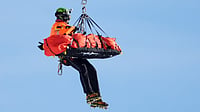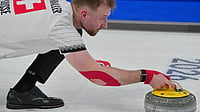Iraq's prime minister announced Tuesday that the Islamic State militant group's leader in Iraq was killed in a military operation along with eight of the group's other senior leaders. US officials said two American service members were injured in the joint raid overnight Monday that was conducted by US and Iraqi forces.
Prime Minister Mohammed Shia al-Sudani said Jassim al-Mazroui Abu Abdul Qader was killed in an operation by counterterrorism forces and the national security service under the Joint Operations Command in the Hamrin Mountains in Salahuddin province.
“There is no place for terrorists in Iraq, and we will pursue them to their hideouts and eliminate them,” al-Sudani said in a statement.
The two US troops are in stable condition, said US Air Force Maj. Gen. Pat Ryder, Pentagon press secretary. He and other US officials said the raid targeted senior Islamic State group leaders, but he could not confirm that Abdul Qader was killed.
He and a second US official said the Pentagon is awaiting final test analysis before confirming who was killed. The second official, who spoke on condition of anonymity to discuss details of a military operation, said the two US troops were being treated in Baghdad.
The Joint Operations Command said in a statement that the operation was carried out “with technical support and exchange of accurate intelligence information by the international coalition forces.”
The identities of the others killed in the operation along with Abdul Qader will be announced after they are confirmed by DNA tests, it said.
The statement also indicated that “large quantities of weapons, ammunition and equipment were seized.”
Last month, the US announced an agreement with the Iraqi government to wrap up the military mission in Iraq of an American-led coalition fighting the Islamic State group by next year, with US troops departing some bases that they have long occupied during a two-decade-long military presence in the country.
A coalition of more than 80 countries, led by the United States, was formed to fight the group, which lost its hold on the territory it controlled in Iraq in 2017 and in Syria in 2019, although sleeper cells remain in both countries and abroad.
For years, Iraqi officials had periodically called for a withdrawal of coalition forces, and formal talks to wind down the US presence in the country were ongoing for months. Iraqi officials have maintained that Iraqi security forces are able to deal with the remaining sleeper cells and prevent the group from staging a resurgence.


























